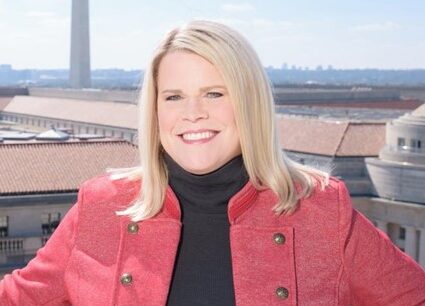For the past several years I have been engaged in a “GOP Outreach Campaign.” This campaign started with a focus on the “ESG Culture Wars.” I’m finding substantial common ground with thoughtful conservatives. Out of this has emerged an awareness about some very good work being done on conservatives on the topic of climate change. Thanks to my good friend Tim Doyle, one of my partners-in-crime on the ESG Culture Wars, I was introduced to Heather Reams, the President of Citizens for Responsible Energy Solutions (CRES). Tim organized a lunch for us when I was in D.C. several months ago. I was impressed and intrigued with Heather and what her organization is doing. I asked her if she’d be willing to do an interview with me and she kindly agreed.
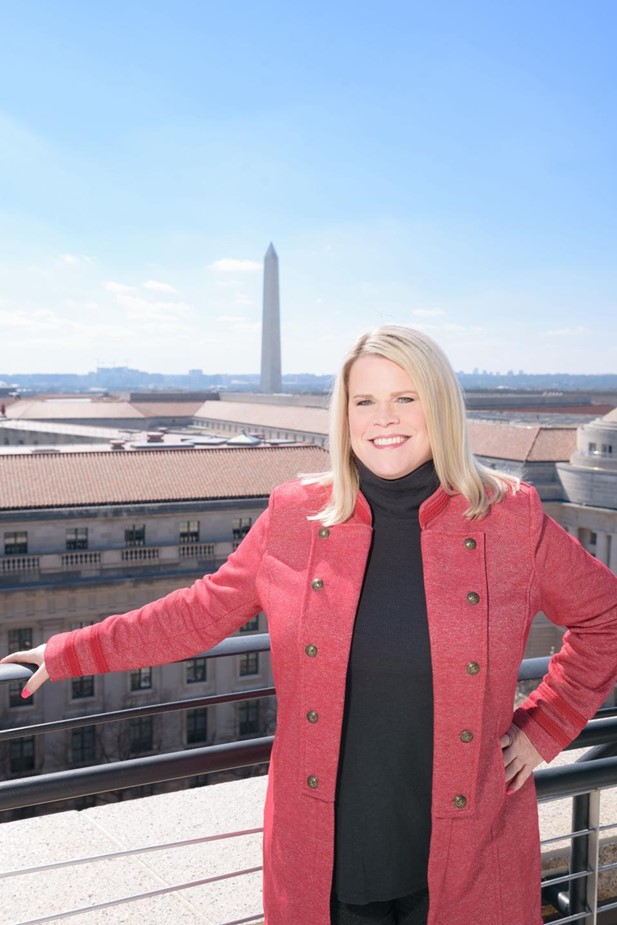
Heather Reams, President of Citizens for Responsible Energy Solutions
Eccles: Heather, thanks for taking the time to talk to me. For starters, please tell me a little about your childhood. Was your family political?
Reams: I grew up in Virginia Beach, Virginia, which is a coastal town on the Atlantic Ocean and the Chesapeake Bay. There was water all around us. We played in the water, we boated on the water, and we crabbed and fished on the water. For me, there was always an affinity to take care of the environment because that’s just how I was raised. Becoming a teenager during the Reagan era, there were a lot of kitchen table discussions about politics and what it all meant. My stepfather would also listen to Rush Limbaugh while wood working in the garage, so that prompted questions from me that he would answer. In addition, Coastal Virginia has a rich history with Williamsburg and Jamestown nearby. These elements together really set the stage for the work I do today, instilling a sense of reverence towards the environment and how the government and politics can impact it.
Eccles: I take it your interest in conservative politics evolved from there?
Reams: Indeed it did! My 12th grade civics and government teacher, Ginny White, invited our class to a lunch fundraiser for the Republican gubernatorial candidate in 1988. I was captivated and declared political science as my major when I started college.
Eccles: How did you get from there to leading CRES?
Reams: After working on Capitol Hill, I spent some years working at consulting firms where I became an expert in crisis communications. As we all know, crisis communication is a 24/7 job, so at some point I decided I wanted to step back. I then started working in education policy at the Association of American Educators and the National Alliance for Public Charter Schools. After working for close to a decade in this field, I felt that I was getting a little too far away from the core of Capitol Hill. That’s when a consultant friend of mine brought me into the CRES fold.
Eccles: Please tell me a little bit about CRES.
Reams: CRES had previously been a consultant-heavy, more behind-the-scenes project. But going into 2016, it was decided that CRES had a more important role to play in changing the conversation on clean energy and climate. So, they brought me in to do an initial assessment of where Republicans were on climate. I quickly realized that there was a political problem and a communications problem. We had to solve those problems before we could really talk about policy. Once I became Executive Director on November 1st, 2016, we doubled down on this and focused on meeting Republicans where they were on climate, not demanding that they take stances on policy positions they may not be comfortable with or make speeches about climate issues they don’t fully support.
Eccles: Ah, 2016. The year Donald Trump was elected President! How did that affect your work?
Reams: With the election of President Trump, we also had a clean tech industry that was increasingly concerned about a president who was potentially adversarial to clean energy tax incentives and climate policy. Congressional engagement became very important and a right of center organization like CRES who could reach these members likewise became increasingly valuable. CRES was founded on the idea of offering Members of Congress carrots – not sticks – when it comes to clean energy and climate policies. Through this approach, we have been able to engage more Republican Members of Congress on clean energy and climate policy than ever before.
Eccles: That makes a lot of sense to me and is very encouraging since he may become President again. You know I’m familiar with and very enthusiastic about the Conservative Climate Caucus (CCC). At lunch you told me you were involved in the formation of the CCC. Please tell me more about that.
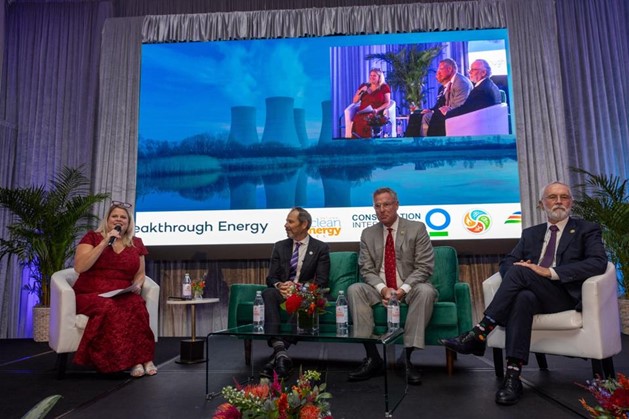
CRES President Heather Reams moderating a panel at National Clean Energy Week (NCEW) 2023 with Reps. John Curtis (R-Utah). Scott Peters (D-Calif), and Dan Newhouse (R-Wash.).
Reams: I met Rep. Curtis (R-Utah) while speaking at a luncheon for Members of Congress on the importance of an all-of-the-above approach to energy. Afterwards, he walked up to me and said, “You think what I think on climate. Who are you, and how can we work together?” From there, we had multiple discussions on how we could highlight the work that Republicans were already doing supporting policy that advanced clean energy and reducing global emissions. In 2021, Rep. Curtis founded the Conservative Climate Caucus. It now boasts over 80 Republican Members of Congress who are active on these issues and understand how important it is to have Republicans at the decision-making table on climate.
Eccles: I’ve had the pleasure of meeting Mr. Curtis and hearing his views in private settings. I’m pleased to see that he is highly likely to become the next Senator of Utah. I’m sure he’ll be even more effective in bringing conservatives into the climate discussion. I’ve actually written about him.
Eccles: I know you had the idea for a Conservative Climate Foundation (CCF). Please tell me more about that.
Reams: In order to better support the Caucus and the greater conservative climate network, CRES co-founded the Conservative Climate Foundation. It focuses on educating lawmakers and the public about the value of clean energy and how Republicans can engage on climate change. So, in addition to my role as the president of CRES and the 501(c) 3) CRES Forum, I have the pleasure of serving as chair of CCF which allows me yet another opportunity to connect with Members of Congress and their staff and advocate for policies that increase energy choices and decrease global emissions.
Eccles: I also know you started National Clean Energy Week. How did you come up with this idea?
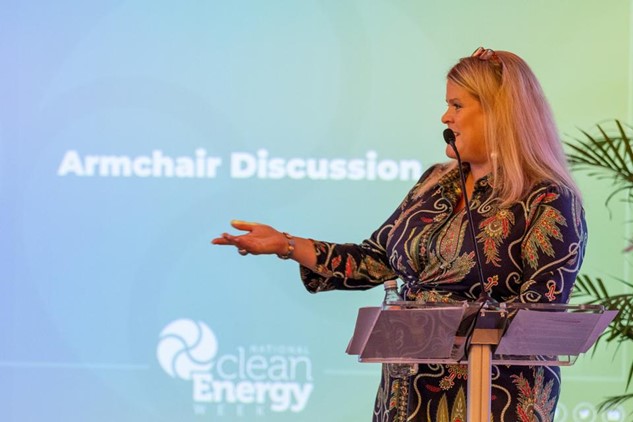
CRES President Heather Reams gives opening remarks at National Clean Energy Week (NCEW) 2023.
Reams: About the time I started at CRES, I realized that there was no national week or day celebrating clean energy. We had Earth Day, but that was it. So, I created National Clean Energy Week which is a celebration of the policies, industries, and innovations that power our daily lives while producing no or very little greenhouse gas emissions. Industry and trade association voices have been eager to lean in on this and showcase how clean energy creates jobs, boosts the economy and results in more affordable and reliable clean energy.
Eccles: I think it’s fair to say that Earth Day is mostly a liberal agenda. Is National Clean Energy Week its conservative counterpart?
Reams: Not at all. National Clean Energy Week is built on bipartisanship. The people who attend it are across the political spectrum. Energy policy should not be a red or blue issue. It should be a red, white, and blue issue. Without bipartisanship, substantial policy that addresses America’s needs, from energy security to emissions reduction in the long term, is not possible. The first National Clean Energy week happened at the end of September in 2017. We had just as many Republicans as Democrats participate, and the kickoff panel in the morning was a discussion between then Secretary of Interior Ryan Zinke and Secretary of Energy Rick Perry moderated by our advisor at the time, Senator Kelly Ayotte (R-N.H.). In that panel, each of the speakers stressed the need for an all-of-the-above energy approach, and I remember sitting there thinking that this is a pivotal moment. There were lots of reporters in the room, and the bipartisan audience came away with the sense that there was common ground between Republicans and Democrats on clean energy. That’s when I knew that we at CRES were onto something.
Eccles: Great to hear and congratulations on creating a great event. You know I think we need a lot more of this. Your next National Clean Energy Week is coming up soon, right?
Reams: Yes! This year, we are excited to celebrate our eighth National Clean Energy Week on September 23-27. Our flagship Policymakers Symposium will once again be a forum for bipartisan conversations about clean energy innovation between elected officials, members of Biden’s administration, policy experts, and trade association and industry voices. You can register for FREE right now at www.nationalcleanenergyweek.org.
Eccles: You’re coming up on eight years as the President of CRES. What do you consider to be your major milestones?
Reams: First, I’d like to highlight CRES’s work on the Infrastructure Investment and Jobs Act. Our team worked closely with 13 House Republicans and 19 Senate Republicans who collaborated with colleagues across the aisle, ensuring the successful passage of this landmark legislation. This legislation has spurred vital investments in clean energy innovation that reduces global emissions and grows the economy. Since its enactment, we have actively highlighted the regional hydrogen hubs and carbon capture projects being implemented in Republican districts, which contribute to strengthening American energy leadership and creating jobs.
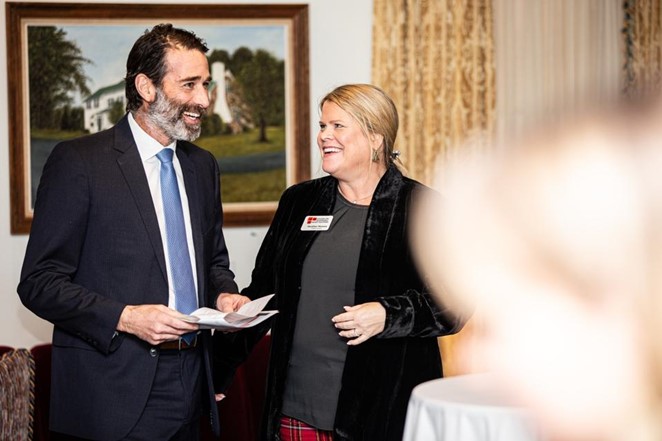
CRES President Heather Reams and Rep. Garret Graves (R-La.) at CRES Forum event (2023).
Eccles: That’s a great example of bipartisan work. What about the Inflation Reduction Act (IRA).
Reams: While we did not support the IRA due to its passage through a wholly partisan process without Republican input, we are actively working to defend specific provisions of the IRA that have historically garnered bipartisan support. These tax credits include those for wind, energy storage, carbon capture, hydrogen, nuclear, biofuels, and more. Most recently, our team engaged with the 18 House Republicans led by Rep. Andrew Garbarino from New York who sent a letter to House Leadership urging the protection of IRA clean energy tax credits that are prompting economic growth in their respective districts.
Eccles: I followed that. A brave thing to do given more extreme Republican rhetoric about the IRA. It will no doubt continue if Trump is re-elected. At the same time, I know you were involved in the Growing Climate Solutions Act. I don’t think most people are as familiar with that so please say more.
Reams: We played a huge role in constructing and advocating for the Growing Climate Solutions Act which received overwhelming bipartisan support in the U.S. Senate, passing with a vote of 92 to 8, with more Republican Senators in favor than Democrats. Following its passage, we launched a six-figure advertising campaign, including a full-page advertisement in The Wall Street Journal, to thank the U.S. Senate and propel the bill forward in the U.S. House, where it was passed as part of the year-end funding package and signed into law in 2022.
Eccles: Any other recent legislation we should know about?
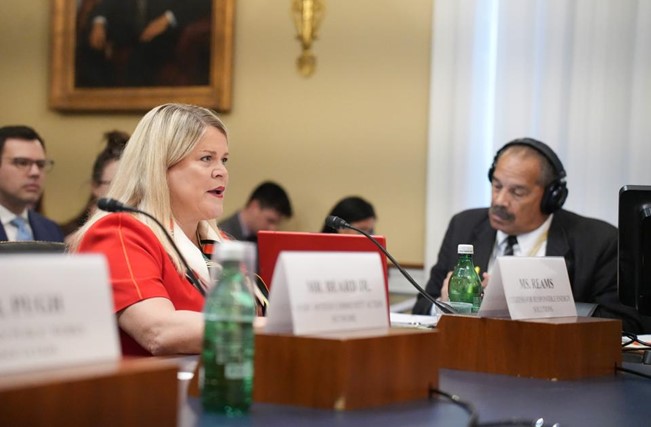
CRES President Heather Reams testifying before the House Committee on Natural Resources (2024).
Reams: Yes! Our team was deeply involved in the Energy Act of 2020 which was the nation’s first clean energy innovation package in more than a decade. Through our advocacy and aligned efforts with Republican leaders in the House and Senate, this bill made it way past the finish line and set the stage for the next four years. These legislative milestones underscore our unwavering commitment to fostering a cleaner energy future through bipartisan cooperation and advocacy.
Eccles: Looking ahead, the Presidential election looks like a coin toss. You know I won’t be voting for Trump and many on the left are deeply concerned about climate issues with him as President. What’s your take on this?
Reams: And I won’t be voting for Harris! It’s safe to say that a Trump Administration would focus on unleashing American energy production. That’s a huge opportunity to increase our American energy security and also decrease global emissions since American-made energy is among the cleanest in the world. Republicans understand this, and they understand that unleashing American energy requires significant permitting reform. Most recently, CRES applauded the bipartisan advancement of Wyoming Senator John Barrasso’s and retiring West Virginia Senator Joe Manchin’s Energy Permitting Reform Act of 2024 from the U.S. Senate Committee on Energy and Natural Resources. This legislation is great example of bipartisan compromise and promises to better streamline certain permitting processes. I am hopeful that this will kickstart conversations in the House this fall and looking to the next Congress.
Eccles: One of the many things I like about the conservative approach is the emphasis on permitting. The difficulty of getting permits is one of the major roadblocks to expanding renewable energy capacity. While opposition to permitting goes across the political spectrum I think it’s fair to say most of it—and the loudest—is from the left. So please tell me more about what’ s going on with permitting.
Reams: The one piece of the permitting puzzle that will have to be addressed is National Environmental Protection Act (NEPA) reforms. Enacting Judicial review and protecting clean energy projects from serial litigants is a major priority for Republicans, especially those in the House. In his first administration, Trump took significant steps to streamline permitting, NEPA in particular, and I think we can expect that to happen again. Apart from permitting reform, our team is gearing up to engage Republicans further on recognizing the economic benefits of clean energy tax incentives and also tapping into conservative support for clean energy innovation. Republicans appreciate the private sector’s role and partnership in taking new ideas and commercializing them so there is another opportunity there to collaborate on clean energy policies that strengthen the United States’ competitive edge.
Eccles: Couldn’t agree more on ensuring America’s competitive edge, as well as energy security, something you mentioned earlier. You’ve been very kind with your time, and I know you have a big week coming up. Before I let you go, please tell me where you see CRES going. What are your objectives for the next five years?
Reams: Since the founding of CRES, we have developed a strong presence on Capitol Hill. Now, we want to maintain that presence while ensuring that communities across the country understand Republicans are at the table on clean energy and climate issues, offering real, practical solutions. Our mission is to connect policymakers and the public, emphasizing our proactive role in leading the conversation on critical energy and climate issues. In that vein, we want to ensure we remain at the forefront of these policy discussions and shape the future of clean energy in the United States and around the world. By fostering Republican engagement and bipartisan collaboration, we aim to craft and promote policies that will drive commonsense energy practices that effectively address climate change. Our efforts are not just about influencing current policies but also about laying the groundwork for a more sustainable future, ensuring that the United States continues to lead in clean energy initiatives both nationally and internationally.
Eccles: Heather, thanks again for our time. You are doing great work at CRES, and I look forward to collaborating with you in the future.
Reams: My pleasure and me too!
SUBSCRIBE TO OUR NEWSLETTER
Subscribe our newsletter to receive the latest news, articles and exclusive podcasts every week


